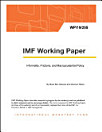The Welfare Implications of Services Liberalization in a Developing Country: Evidence from Tunisia
Mr.Nizar Jouini · Mr.Nooman Rebei
Mei 2013 · International Monetary Fund
Kitabu pepe
43
Kurasa
reportUkadiriaji na maoni hayajahakikishwa Pata Maelezo Zaidi
Kuhusu kitabu pepe hiki
We propose an integrated method based on a two-sector small open economy dynamic and stochastic general equilibrium model to estimate non-tariff barriers and quantify the impact of services liberalization. The major component of trade barriers is explicitly modeled through the introduction of entry-sunk costs. Hence, liberalization is treated assuming a government's policy decision aimed at reducing those costs. Then, we estimate the model using Bayesian techniques for Tunisia and the Euro Area. The paper presents a precise quantitative evaluation of services trade barriers as the difference between entry-sunk costs in Tunisia versus the Euro Area. We find significant welfare benefits in addition to aggregate and sectoral growth gains the Tunisian economy could attain following services liberalization. Surprisingly, the goods sector is the one that benefits the most from services liberalization in the short- and long-term horizons.
Kadiria kitabu pepe hiki
Tupe maoni yako.
Kusoma maelezo
Simu mahiri na kompyuta vibao
Sakinisha programu ya Vitabu vya Google Play kwa ajili ya Android na iPad au iPhone. Itasawazishwa kiotomatiki kwenye akaunti yako na kukuruhusu usome vitabu mtandaoni au nje ya mtandao popote ulipo.
Kompyuta za kupakata na kompyuta
Unaweza kusikiliza vitabu vilivyonunuliwa kwenye Google Play wakati unatumia kivinjari cha kompyuta yako.
Visomaji pepe na vifaa vingine
Ili usome kwenye vifaa vya wino pepe kama vile visomaji vya vitabu pepe vya Kobo, utahitaji kupakua faili kisha ulihamishie kwenye kifaa chako. Fuatilia maagizo ya kina ya Kituo cha Usaidizi ili uhamishe faili kwenye visomaji vya vitabu pepe vinavyotumika.






